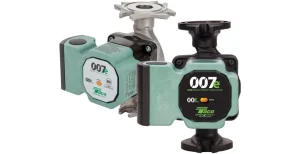The choice between ECM and AC pumps greatly impacts long-term utility savings. ECM pumps adjust their operation based on demand, promoting energy efficiency, while AC pumps run at a constant speed, potentially increasing energy consumption during low-demand periods. This fundamental difference affects overall performance and cost-effectiveness. As consumers seek to optimize energy use and reduce expenses, understanding these distinctions is essential for informed decision-making. The implications of this choice extend beyond initial investment, warranting further exploration.
Key Takeaways
- ECM pumps offer variable speed control, optimizing energy use and reducing costs during fluctuating load demands.
- AC pumps operate at a constant speed, leading to higher energy consumption, especially during low demand periods.
- The advanced technology in ECM pumps results in higher overall efficiency, translating to significant long-term utility savings.
- While ECM pumps may have higher upfront installation costs, their lower maintenance needs and energy efficiency can yield better financial returns.
- For consistent load applications, AC pumps may be more cost-effective initially, but they generally lead to higher long-term energy expenses.
Understanding ECM and AC Pumps: An Overview
Pumps play an essential role in various heating, ventilation, and air conditioning (HVAC) systems, and understanding the distinction between ECM (Electronically Commutated Motor) and AC (Alternating Current) pumps is fundamental for optimizing energy efficiency. ECM pumps utilize advanced electronics for variable speed control, allowing for precise adjustments that match system demands, thereby reducing energy consumption. In contrast, AC pumps operate at fixed speeds, which can lead to inefficiencies, particularly in systems with fluctuating load requirements. This difference between ECM and AC pump designs considerably affects operational costs and overall performance. By choosing the appropriate pump type, HVAC professionals can enhance system reliability and longevity, ultimately contributing to sustainable energy practices and improved user comfort, fostering a sense of community among those invested in efficient technologies.
The Key Differences Between ECM and AC Pumps
When comparing ECM and AC pumps, several key differences emerge that significantly influence their application and efficiency in HVAC systems. Understanding the difference between ECM and AC pumps is essential for informed decision-making.
- Motor Technology: ECM pumps utilize electronically commutated motors that adjust speed based on demand, while AC pumps operate at a constant speed, leading to potential energy waste.
- Control Mechanisms: ECM pumps feature advanced control systems, allowing for precise modulation of flow rates, whereas AC pumps lack this adaptability, resulting in less efficient operation.
- Installation and Maintenance: ECM pumps generally require more complex installation and specialized maintenance, contrasting with the simpler setup of AC pumps, which may appeal to cost-sensitive users.
These differences highlight the unique characteristics of each pump type and their implications for long-term utility savings.
Energy Efficiency: How Each Pump Affects Utility Savings
Although energy efficiency is a critical factor in determining long-term utility savings, the performance of ECM and AC pumps varies considerably. ECM (Electronically Commutated Motor) pumps typically operate at higher efficiency levels, utilizing variable speed technology to adjust flow rates based on demand. This adaptability can lead to significant energy savings, especially in systems with fluctuating load requirements. In contrast, AC (Alternating Current) pumps generally run at a fixed speed, consuming more energy during periods of low demand. Consequently, the difference between ECM and AC pump efficiency can influence overall energy costs. Users seeking ideal utility savings should carefully consider these distinctions, as selecting the most efficient option can yield substantial long-term financial benefits.
Installation and Maintenance Considerations
Selecting the appropriate pump type necessitates careful consideration of installation and maintenance factors, as these elements can greatly impact overall system performance and longevity. ECM and AC pumps exhibit distinct requirements that users must evaluate.
- Installation Complexity: ECM pumps often require specialized knowledge for setup, whereas AC pumps generally allow for straightforward installation.
- Maintenance Needs: ECM pumps tend to have lower maintenance requirements due to their advanced technology, while AC pumps may need more frequent servicing.
- Performance Monitoring: ECM systems often include built-in diagnostics, enhancing maintenance efficiency, unlike AC pumps, which may rely on traditional methods.
Understanding the difference between ECM and AC pump installation and maintenance will aid users in making informed decisions that align with their long-term utility savings goals.
Making the Right Choice for Your Home or Business
How can one determine the most suitable pump type for their specific needs? Evaluating the difference between ECM and AC pumps is essential for informed decision-making. ECM pumps offer variable speed capabilities, enhancing energy efficiency and comfort in variable load conditions, making them ideal for residential applications. Conversely, AC pumps provide a straightforward, cost-effective solution for consistent load scenarios, often preferred in commercial settings. Key considerations include the specific application, energy savings potential, and upfront costs. Homeowners and business operators alike should assess their unique requirements and energy consumption patterns. Conducting a thorough analysis can lead to substantial long-term utility savings, ensuring that the chosen pump type aligns with both immediate and future operational goals.
Frequently Asked Questions
How Long Do ECM and AC Pumps Typically Last?
Typically, ECM pumps last around 15 to 20 years, while AC pumps have a lifespan of 10 to 15 years. Factors such as usage, maintenance, and environmental conditions greatly influence their longevity and performance.
Can ECM Pumps Work With Older HVAC Systems?
ECM pumps can function with older HVAC systems, provided compatibility is guaranteed. Their advanced motor technology may enhance efficiency, but retrofitting may require adjustments to accommodate differing electrical requirements and operational parameters of legacy systems.
What Noise Levels Can I Expect From Each Pump?
Noise levels from pumps vary considerably. ECM pumps generally operate more quietly, often producing lower decibel levels compared to traditional AC pumps, which can generate more noise due to their mechanical components and operational characteristics.
Are There Specific Brands Recommended for ECM or AC Pumps?
When considering specific brands for ECM or AC pumps, consumers should evaluate options from reputable manufacturers like Grundfos or Taco for ECMs, and Trane or Carrier for AC pumps, ensuring reliability and efficiency in their long-term utility savings.
How Do ECM and AC Pumps Affect Indoor Air Quality?
ECM and AC pumps greatly influence indoor air quality. ECM pumps enhance airflow consistency, reducing humidity and allergens, while AC pumps may struggle with fluctuating performance, potentially leading to increased dust and poor ventilation in spaces.
Conclusion
To sum up, the choice between ECM and AC pumps greatly impacts long-term utility savings. ECM pumps, with their variable speed capabilities, demonstrate superior energy efficiency, particularly in applications with fluctuating demands. By minimizing energy waste, these pumps not only reduce operational costs but also enhance overall system performance. As a result, for consumers prioritizing energy conservation and financial prudence, investing in ECM pumps emerges as a strategically advantageous decision in both residential and commercial settings.
You May Also Like:




